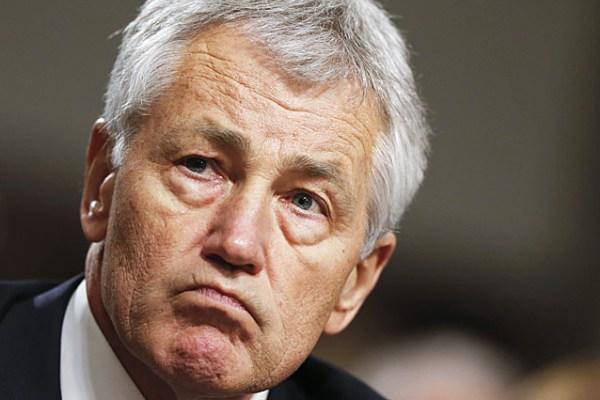Chuck Hagel on Sunday joined the list of former Defense Secretaries who have clashed with President Barack Obama on Mideast policy, the war against ISIS and "micromanagement" of the military.
Echoing former Defense Secretaries Leon Panetta and Robert Gates, Hagel said he had difficulty getting his advice through to the White House and pointed to a "secret memo" he sent just before offering his resignation in late 2014.
On CNN's "State of the Union" program, Hagel said the administration had been too focused on getting Syrian President Bashar al-Assad out of office and should turn its attention more to the fight against the Islamic State of Iraq and Syria, or ISIS.
"Well, Assad is a very bad guy," Hagel said. "There are bad guys all over the world, but I think it's pretty clear that ISIS represents the real threat to our country, to the world. Assad has to be dealt with, but you can't confuse your allies and your adversaries by saying Assad must go."
In the memo he sent in 2014, the former two-term Republican senator from Nebraska and Army sergeant in Vietnam, said his main complaint was that the administration had failed to define its "political strategy" in attempting to oust Assad.
U.S. Central Command has acknowledged that confusion over the goals resulted in the failure of its attempt to recruit an army of 5,000 so-called "moderate" Syrian fighters. The opposition groups mainly wanted to fight the forces of Assad while the U.S. wanted to limit their efforts solely to ISIS.
Hagel in late 2014 offered his resignation, and Obama accepted. Then-Deputy White House Press Secretary Eric Schultz later said at the time there had been "friction" between Hagel and the White House on a range of issues.
Less than two years earlier, now-Defense Secretary Ashton Carter, then deputy defense secretary and the Pentagon's No. 2, resigned when Hagel was given the top job. When Hagel was ousted, Obama chose Carter over former Pentagon policy chief Michèle Flournoy and others as secretary.
Hagel made his latest remarks as reports emerged alleging that Centcom was doctoring intelligence to show progress against ISIS and Obama urged Americans and nations worldwide not to succumb to fear in the aftermath of the Paris terror attacks claimed by ISIS that killed at least 129 people.
"We do not succumb to fear," he said during a news conference in Malaysia closing out the final leg of his nine-day, three-nation trip overseas. "The most powerful tool we have to fight ISIL (another acronym for ISIS) is to say that we're not afraid."
Obama called on Americans not to elevate ISIS "and to somehow buy into their fantasy that they're doing something important."
Earlier on his trip, the president lashed out against critics. "If folks want to pop off and have opinions about what they think they would do, present a specific plan," he said.
On intelligence, The New York Times reported that a Defense Department Inspector General's investigation was underway of allegations that Centcom had downplayed reports by analysts of failures in the fight against ISIS.
The Times cited intelligence reports on the Iraqi Security Forces (ISF) fleeing and abandoning equipment as ISIS advanced out of Syria in 2014. The command allegedly altered the reports to say that the ISF had "redeployed."
In the wake of the Paris attacks, Centcom has twice in the past week conducted detailed briefings to the Pentagon on progress against ISIS, including videos and maps showing that territory controlled by ISIS was steadily being diminished.
At the first briefing, Army Col. Steve Warren, a spokesman for Combined Joint Task Force-Operation Inherent Resolve, said, "I think it's important for everyone to understand our overarching objective, which is to partner with indigenous ground forces, enable those indigenous ground forces to conduct offensive operations and then provide coalition air power on top of those offensive operations."
Warren said that U.S. and coalition airstrikes were degrading ISIS oil facilities, an important source of revenue, and enabling the Kurds to expand territory in their control while assisting the ISF in completing the encirclement of Ramadi.
"As indigenous friendly forces maneuver against our enemy, it causes our enemy to move. The enemy has to react, and as soon as the enemy reacts, we kill them from the air," Warren said.
In a separate briefing, Air Force Col. Pat Ryder, a spokesman for Centcom headquarters in Tampa, said, "We're encouraged by recent gains that have been made."
Ryder said that ISIS was on the defensive across the battlespace. When asked if ISIS fighters were still capable of mounting offensive operations, he said they were, but their capacity was small-scale and limited.
--Richard Sisk can be reached at Richard.Sisk@military.com.
Don't Miss a Single Military.com Story
To read the full article and get exclusive benefits, sign up today.
It’s FREE
Why am I seeing this? Visit our FAQs




























